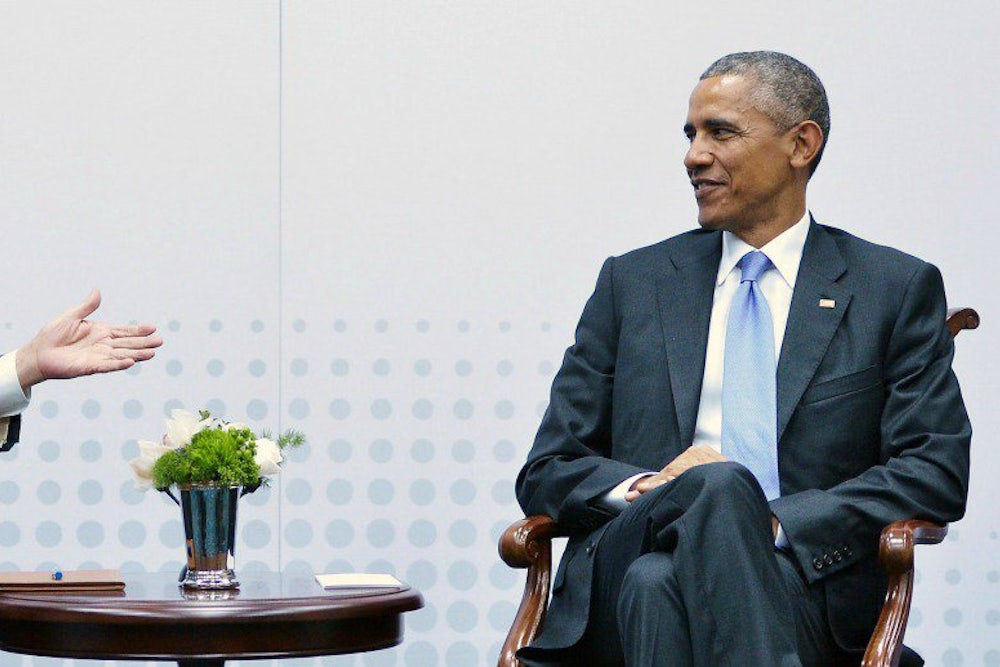For all his efforts abroad during his second term, President Barack Obama’s greatest foreign policy achievement has come in a region often overlooked, despite being “America’s backyard”: Latin America. The historic opening of relations with Cuba, which took 18 months of secret negotiations the Vatican facilitated, was symbolically displayed at the seventh Summit of the Americas over the weekend with the meeting of Obama and Cuban President Raul Castro. In the first such encounter in five decades, the two leaders talked for an hour on Saturday. Obama described their meeting as “candid and fruitful.”
Obama has urged Congress to dismantle the U.S. embargo on Cuba, for it—along with other attempts to exclude Cuba from hemispheric initiatives—has long isolated the U.S. in Latin America and around the globe. Conscious of this fact and hoping to re-engage with a region that has increasingly sought independence from U.S. influence, Obama declared in remarks on Friday that the days when the “United States could meddle with impunity” in Latin America are “past.”
“So often, when we insert ourselves in ways that go beyond persuasion, it’s counterproductive, it backfires,” Obama said. “The United States will not be imprisoned by the past—we’re looking to the future. … I’m not interested in having battles that frankly started before I was born.”
Obama’s remarks, coupled with concrete moves toward opening relations with Cuba, will add to the positive views Latin Americans currently have of the United States. Before the announcement of intentions to restore diplomatic ties in December of last year, 65 percent had a favorable opinion of the country. Even Castro had mildly positive things to say of Obama, absolving him of responsibility for the history of U.S. hostility to the Cuban Revolution. “There were 10 presidents before him; all have a debt to us, but not President Obama,” Castro said. “I have read his books—parts of them—and I admire his life.”
The meeting overshadowed the typical anti-American rhetoric at regional summits where vocal, left-leaning leaders criticize U.S. actions in the region. The United States recently declared Venezuela a national security “threat” and adopted sanctions against members of the Venezuelan government for human rights violations. Observers worried that denunciations of these acts would distract from the summit’s goals of fostering greater cooperation. Even leaders close to the United States, such as Colombian President Juan Manuel Santos, had denounced the move. But Obama eased some of this tension on Thursday by stating that Venezuela and the United States aren't threats to one another. Venezuelan President Nicolas Maduro described his own meeting with Obama as “frank,” adding it was possible to seek “a path to relations with respect, which is fundamental.”
The diplomatic breakthrough with Cuba contrasts with Obama’s many frustrated attempts around the globe. Events in the Middle East and Ukraine have delayed his initiative referred to as the “pivot” to Asia. As Joshua Keating of Slate demonstrated last year, the diplomatic and military resources allocated to the continent have not markedly increased since 2011, when Hillary Clinton, then the Secretary of State, announced the supposed reorientation of U.S. focus abroad. Despite some high-level meetings, “there doesn’t seem to be much evidence that the administration is spending more of its energy on Asia, or less of it on the Middle East, than it did previously,” Keating wrote.
Obama inherited more than one war from the Bush administration and was forced to navigate the political instability that followed the Arab Spring. But some of Obama’s challenges in the Middle East have come of his own making. His drone-heavy counter-terrorism approach in Yemen and the decision to pursue regime change in Libya have produced troubling outcomes as both slide further into civil wars, drawing in regional powers. Secretary of State John Kerry’s signature initiative—peace talks between the Israeli government and the Palestinian Authority—broke down a year ago, surprising no one. Though he avoided direct intervention in Syria with a largely successful deal to remove the country’s chemical weapons, Obama has failed to formulate a coherent policy toward the conflict. The rise of ISIS and its control of vast swaths of territory in war-torn Iraq and Syria pose a challenge with no easy solutions. Ukraine’s war and Russia’s involvement drag on.
Obama's major initiative with the best shot at success is a nuclear deal with Iran. Like renewing ties with Cuba, it would be a formidable achievement. For now, though, Cuba stands alone as the finest accomplishment in Obama's foreign policy.
